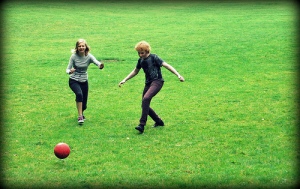 Schools today don’t play fair. We’re on a crooked path educationally because of an addictive dependency on academics. Unmistakably our reliance on experts, instruction, and anything curricula related has caused a destructive path to our society and the way in which we relate to each other and the natural world. We’re an “uptight” and “rigid” society that has almost forgotten how to play.
Schools today don’t play fair. We’re on a crooked path educationally because of an addictive dependency on academics. Unmistakably our reliance on experts, instruction, and anything curricula related has caused a destructive path to our society and the way in which we relate to each other and the natural world. We’re an “uptight” and “rigid” society that has almost forgotten how to play.Our traditional school system in archaic, unsustainable, and fails at preparing students as citizens to take utmost responsibility with their education and in facing the critical issues and concerns of our times. Play barely makes the class schedule or curriculum agenda. Little time in schools is devoted towards providing non-structured and uninterrupted activities for kids to freely choose. Conventional schools have the home field advantage on academics and play is usually the first to be ejected, suspended, cut from the budget or other wise broken up into chunks of time on the school bell schedule, we call recess. Recess, a time when youth common freely play, has culturally become marginalized by the high demand of standardized testing, prescribed curricula, methodologies, and surveillance measures sprung forward from bureaucratic policies and demands. In school the pupil is “schooled” to confuse teaching with learning, grade advancement with education, a diploma with competence, and fluency with the ability to say something new. His imagination is “schooled” to accept service in place of value (Illich, 1972).” In a world of academics there is no balance, imagination, creativity, and our natural pull in childhood to freely play receives a crushing blow. The purpose of these pages is reexamine the value of free play as a trusting way for youth to follow their interests and guide themselves towards taking on more responsibilities.
No comments:
Post a Comment